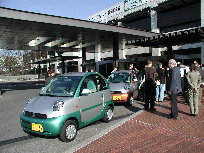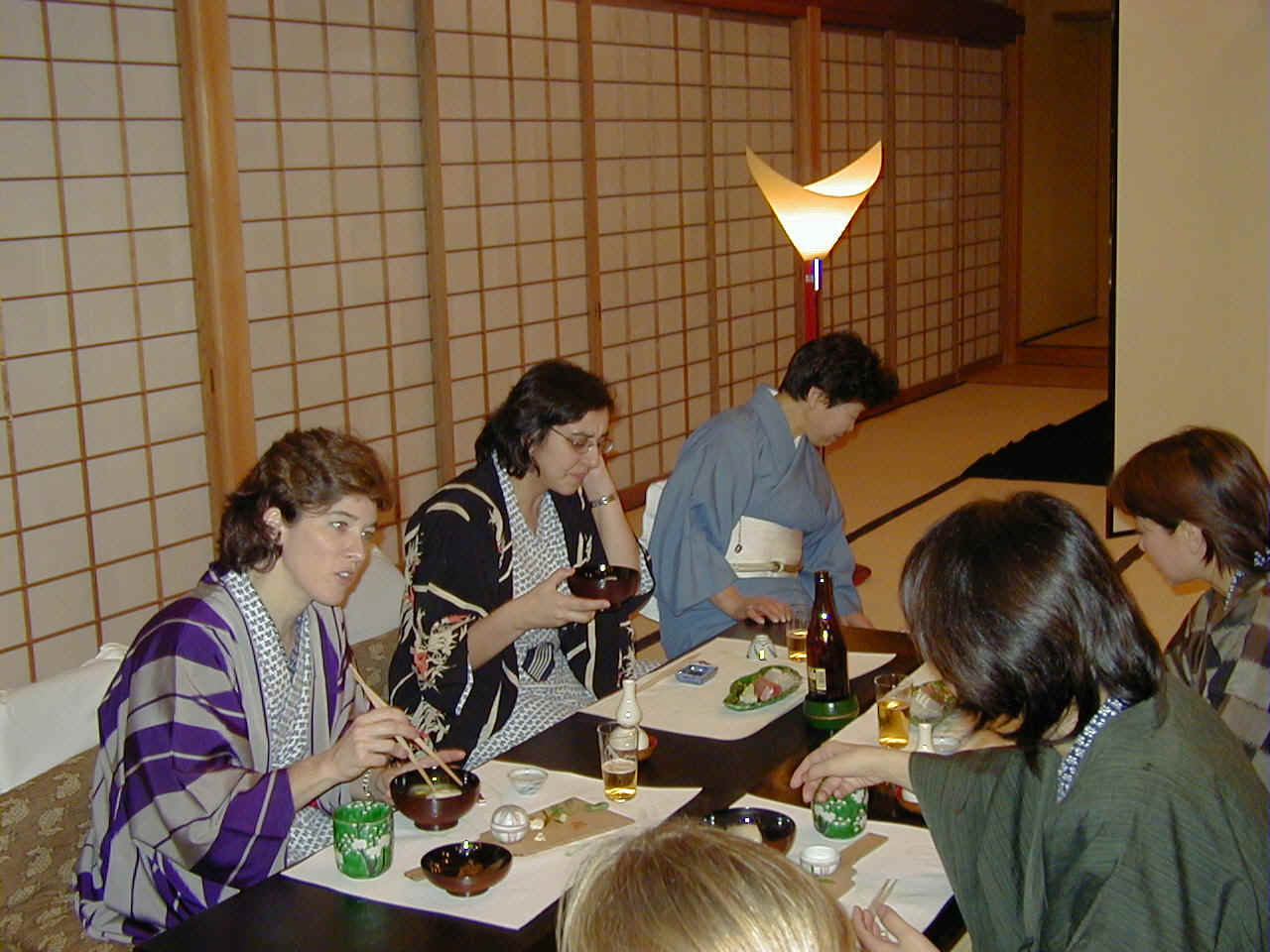The East Asian Forum
Tokyo, Nagoya and Kyoto, Japan,
January 15-19,2002
This Forum is also called the Tokaido Forum as it follows the historic Tokaido Road between Tokyo and Kyoto.
The first two days in Tokyo bring participants in contact with leaders and experts to focus on such issues as deflation, political change, deregulation and society. They meet executives from well known Tokyo companies such as Mitsubishi, Toshiba, UniQlo, Mercian, SONY, Shiseido and Fuji Xerox as well as JR Railways before moving on to Nagoya. Stopping overnight at HoRai - a famous traditional Japanese ryokan and onsen the Forum enjoys a peaceful winter scenery during philosophical discussions about the future. In Nagoya, a visit to Toyota brings Forum participants in touch with Japan's success stories in quality, design, production and international marketing.
The final two days of the Forum are in Kyoto, Japan's ancient capital. Here participants meet with four of Japan's leading global high technology companies including Omron, Horiba and Wacoal and visit the most specialized markets of Japan, taking advantage of Kyoto's rich culture to understand the ways of Japan, its heritage in East Asia and its role in the future of this region. The International Forum in Japan follows the 18th century Tokaido Road-vividly depicted by Hiroshige in his wood block prints-linking Japan's two capitals.
Japan represents two-thirds of the East
Asian economy. What is its future role and how will its economic recovery
affect the growth prospects of the East Asian tigers and the future
participation of China?
The East Asian Forum also considers the future of China, Taiwan, Korea and Southeast Asia from the perspective of Japan. Discussions and encounters compare the differences and similarities between each system's structure of industry, corporate governance, management structures, innovation and processes.
Issues Facing the Participants of the East Asian Forum
A challenge for The International Forum in Japan is to better understand the forces of globalization – to identify the similarities and differences among regions of the world and within East Asia itself – to understand the changes that are taking place and the implications they have for a global business. Which of these changes can be described as globally integrating forces such as communications, technology, and financial markets, and those that need to be differentiated on a regional or local basis such as culture, corporate structure, law, social change, and marketing? Successful organizational strategies reflect the different ways in which companies in East Asia, Europe and North America approach the functions of managing people, focus on the customer, financing, networking and strategic alliances, manufacturing, innovation and R&D, marketing, assessing performance and being accountable to stakeholders.
Globalization has brought with it the cross-fertilization of ideas and ways of doing things. Western business practice and shareholder capitalism, as a rational basis for the firm and its goals, has achieved widespread appeal, but it is doubtful that this also means full acceptance – especially among those cultures that have different reasons for the way they conduct their business.
Shareholder Capitalism in Japan and East Asia
The forms of capitalism that have emerged in Japan, Korea and among the ethnic Chinese communities in East Asia have different premises from the Anglo-American concept of shareholder capitalism. Themes that emerge from these forces are:
| How will Japanese companies respond to the pressures of free market shareholder capitalism? Will they adopt the concept of shareholder value while maintaining their traditional focus on the employee, customer and community? Which companies in Japan are likely to change and how will this be different for companies in Tokyo, Nagoya and Kyoto? |
In a world that "will never be the same after September the 11th", which forms of capitalism are most likely to have advantages in a higher risk and uncertain world?
| How should companies organize international operations to recognize the cultures and values reflected in other forms of capitalism—particularly those in East Asia—when dealing with customers, employees, suppliers, competitors, alliances and the communities where they do business? |
| In what ways can international companies help their managers to understand these different systems of economic behavior. |
The Forum examines the different "forms" of capitalism that have emerged in Japan, Korea and among the ethnic Chinese communities in East Asia. Participants are asked to think about the reasons for these differences and in doing so will have the opportunity to meet, interview and visit with those who manage companies in Japan, Korea and other parts of East Asia.

Japan in Times of Change – Innovation and Reinvention
The process of globalization affects almost all businesses and most nation states – Japan is no exception. For some years, Japan has been undergoing the pressures of change brought about by globalization. As an island culture, it values its traditions, appearing to resist change. Yet Japan has demonstrated throughout its history that, with pressure to do so, it can respond well to the need for change. It has a remarkable ability to adopt foreign ideas into its own culture with great effectiveness. One example is the Japanese language, but there are many more. Japan’s record of reinventing itself and its institutions is exceptional; its leading companies illustrate this. Japan’s creativity comes in many forms, particularly in art and design, yet also in process re-engineering where it’s firms continue to innovate.
A theme of this Forum is Innovation and Reinvention. Participants will be asked to seek answers as to how Japan and Japanese companies have dealt with change and why they have continued to reinvent themselves and innovate. How can these lessons be applied to the strategic choices that must be made by leaders of global corporations?
Japan and East Asia
Japan’s heritage in East Asia is examined in the context of Kyoto, its ancient capital and center of culture. Kyoto was founded on the plan of the great city of Chang’an (Xian today), capital of the Tang Dynasty of China.
| How will Japan’s relationship with China – political, psychological and economic – evolve in the future and what are the implications for the rest of East Asia and the world? |
| How are Japanese companies seeking opportunities in China – as a source for production, a market for products and a base for R&D and development? |
| What fundamental changes if any have occurred as a result of, or following the East Asia financial crisis? How will these changes be manifested in the future economic well being of Thailand, Singapore and the Philippines? What will emerge from the economic and political courses set by Malaysia and Indonesia? What is Islamic fundamentalism likely to become in East Asia? |
Learning from Differences
Just as no man is an island, neither does any country, company or people ever develop in isolation. Each of us learns from others, borrowing ideas and building on them with our own. From food to art to business, the nations of the world have been exchanging ideas for centuries. Noodles brought from China became pasta in the hands of Italians. Design concepts from Japanese woodblock print artists influenced Impressionism under the paintbrushes of the Europeans. American engineering reaches new levels of perfection in the automobile factories of the Japanese.
There are lessons to be learned from each other through careful observation of the social, cultural and business environments of others. What lessons can be learned from Japan?
Clues in the Landscape
In the course of this Forum, participants will hear,
observe, experience and think about many different aspects of Japan. Some
of these will be contrasted with other parts of East Asia, Korea and China
in particular. The Forum provides these opportunities in the sessions and
discussions, which are described in this agenda book, along with walks in
the morning, visits to important sites and explorations to be conceived by
the participants themselves.
A special task for the participants of this Forum is to think creatively about what can be learned from the ways of others, to observe differences in culture or in business practice which may provide new insights and, if adapted to one’s own situation, may result in more effective ways of doing things. More specifically, by observing aspects of Japan’s culture – its society, change, business, organizations, art, sports, architecture, community, government, etc.
| What can we learn about Japan that will improve our understanding and ability to relate to the Japanese? | |
| What can we learn that, if adapted to the way we do things "at home", would help us to better manage our lives, our companies and our communities? (For Japanese participants at the Forum, there is much to be learned from seeing the way that others view them.) |
| What can we learn that will help us in leading a global enterprise to balance both global and local elements in the challenges and opportunities it will face? |
| In what ways can an understanding of Japan and its position provide a context in which to consider the economic, political and cultural challenges facing the East Asia region and the future importance of China and East Asia to the rest of the world in future? |
More Information
The East Asian Forum Agenda and Biographies Book
Published Resources
©The International Forum 2002. All rights reserved.
